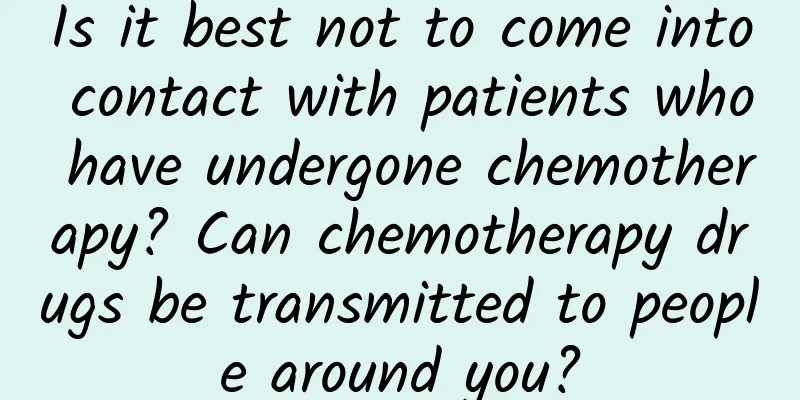Is it best not to come into contact with patients who have undergone chemotherapy? Can chemotherapy drugs be transmitted to people around you?

|
Rumor: "It is best not to contact patients who have just undergone chemotherapy" Recently, there have been rumors online that "it is best not to contact patients who have undergone chemotherapy because chemotherapy drugs may be exhaled or transmitted to others through other means." Rumor analysis: This statement is totally untenable. Chemotherapy is a treatment method that kills cancer cells through chemical drugs. The drugs will reach the whole body through blood circulation, act on cancer lesions, and may also affect some normal tissues and cause toxic side effects. After being metabolized in the patient's body, chemotherapy drugs are mainly excreted through body fluids such as urine, feces, and sweat, but these metabolites have little effect on healthy people. In addition to close caregivers recommending necessary protection when handling patient excrement (such as washing hands, wearing masks and gloves, not sharing tableware, etc., which is actually a basic personal hygiene requirement), normal daily contact with patients undergoing chemotherapy will not cause physical harm to healthy people. On the contrary, after chemotherapy, the patient's immune system will be suppressed, the body's defenses will be reduced, and it will be easy to be infected with common diseases such as colds and flu. When normal people come into contact with chemotherapy patients, they should pay attention to their own hygiene to avoid transmitting germs or viruses to patients. Recently, a saying has been widely circulated online: It is best not to contact patients who have undergone chemotherapy. The reason for this is that someone asked, do patients undergoing chemotherapy have any impact on the normal people around them? Then a netizen took a doctor's reply to this question and put it in the comment area, which aroused discussion and attention from many netizens. The specific content is as follows: Image source: A social platform Do patients undergoing chemotherapy really have an impact on the normal people around them? Do the chemotherapy drugs in patients really harm the people around them? Let me first give you a direct and clear answer: patients undergoing chemotherapy will not cause physical harm to other people who have normal contact with them. What is chemotherapy? What are the side effects of chemotherapy? Chemotherapy is one of the main treatments for malignant tumors (cancer). Many cancer patients need chemotherapy of different intensities and methods at different stages of treatment. The essence of chemotherapy is a drug treatment method that uses chemical drugs to kill cancer cells. Chemotherapy is also called cytotoxic drug therapy. It usually enters the body of cancer patients through intravenous infusion or oral administration, and then the drugs flow to all parts of the body with the blood circulation. In theory, as long as there is blood flowing, chemotherapy drugs may reach, including the location of cancer lesions, and also other normal organs and tissues without lesions. Chemotherapy drugs reach the location of cancer lesions to kill cancer cells, thereby playing a therapeutic role, but because they also reach other normal tissues and organs at the same time, they will also harm normal cells, and therefore, toxic side effects will inevitably occur. The toxic side effects of chemotherapy are very wide, including rash, hair loss, allergies, oral mucositis, nausea and vomiting, diarrhea, cardiopulmonary, liver and kidney toxicity, bone marrow suppression, neurotoxicity, etc. For example, nausea, vomiting and diarrhea occur because chemotherapy drugs damage the gastrointestinal mucosal cells, hair loss occurs because chemotherapy drugs damage hair-growing cells, and a decrease in white blood cell count occurs because a large number of white blood cells in the peripheral blood are killed by chemotherapy drugs, and the bone marrow cannot replenish its blood in time. Copyrighted stock images, no reproduction is authorized However, these side effects of chemotherapy are actually reversible, and not every patient who undergoes chemotherapy will experience them. This depends on the chemotherapy regimen and drugs used. Different chemotherapy drugs have different side effects. Some chemotherapy drugs are prone to vomiting, while others are prone to hair loss. And there are great individual differences, which means that different patients have different side effects of chemotherapy. The same regimen and the same drugs will also have different reactions. Chemotherapy has side effects, which is the main reason why many people "criticize" chemotherapy. Some people say that chemotherapy is too harmful to the body, and some people even say that chemotherapy should never be used. It is better not to use chemotherapy, but chemotherapy will make you die faster. This is actually an extreme and subjective way of thinking. We should not only see the side effects of chemotherapy, but also its therapeutic effects. Not only chemotherapy, but other drugs and treatments also have both advantages and disadvantages. We should look at the problem dialectically and objectively. If you have cancer, whether chemotherapy is needed or not should be comprehensively evaluated based on the cancer pathological type, stage, sensitivity to chemotherapy (clinical research data), and the patient's physical condition. We can neither simply say that chemotherapy is good, nor simply deny chemotherapy. Both extremes are unacceptable. Will patients who have undergone chemotherapy cause harm to people around them? The side effects of chemotherapy mentioned above are mainly for patients undergoing chemotherapy. So will patients undergoing chemotherapy have any impact on other people around them? The answer is of course no. Chemotherapy drugs are divided into chemotherapy drugs dissolved in glucose solution or saline and prepared by medical staff, and oral chemotherapy drugs. They enter the patient's body through intravenous infusion or oral administration, and are mainly excreted through body fluids such as urine, feces, and sweat after metabolism in the patient's body, but these metabolites have little effect on healthy people and will not be transmitted through breathing or contact. In other words, contact with patients undergoing chemotherapy will not cause any physical harm to healthy people. Copyrighted stock images, no reproduction is authorized However, chemotherapy does have some toxicity. Medical staff who are directly engaged in the preparation of chemotherapy drugs must take good protection during the operation to avoid chemotherapy drugs contacting the skin and causing local irritation symptoms (such as erythema, blisters, etc.), or inhaling chemotherapy drugs through the respiratory tract to cause nasal mucosal soreness, eye burning, dizziness, nausea, etc. But this means that nurses must take good protection during the preparation of chemotherapy drugs. The prepared chemotherapy drugs are dissolved in glucose solution or saline, or taken orally, so they will not evaporate and will not run to other people. Of course, considering that chemotherapy drugs and their metabolites in patients can be excreted through sweat, urine, feces, etc., for safety reasons, try to avoid direct contact with chemotherapy patients' feces, urine, vomit and other excretions. When handling these excretions, relatives who are closely caring are recommended to take some necessary protection, such as wearing masks and gloves, washing hands, washing personal items such as underwear and daily necessities separately as much as possible, using public chopsticks, and not sharing tableware, etc. In fact, this is also a basic personal hygiene requirement. Special precautions should be followed according to the instructions of doctors and nurses. Therefore, for other people, there is no need to worry about contacting patients undergoing chemotherapy: shaking hands, hugging, eating together... There is no problem, and it will not cause any physical harm to healthy people. On the contrary, the patient's immunity decreases after chemotherapy, and they must take good protection when contacting other people to avoid being "infected" with common colds, flu, etc. from others. Sometimes this may have serious consequences for the patient, which means that the person who needs to be protected is actually the patient himself. Whether it is family members or friends around you, there is no need to worry about being harmed by the so-called chemotherapy due to contact. Don't confuse chemotherapy and radiotherapy, they are not the same thing Many people confuse chemotherapy and radiotherapy, but they are not the same thing. Chemotherapy is a drug treatment, and its side effects only affect the patient who is receiving chemotherapy, and will not cause any harm to other people around him. Radiotherapy is different. Radiotherapy is the abbreviation of radiation therapy, that is, it has ionizing radiation, and it kills tumor cells by irradiating tumor lesions with radiation to play a therapeutic role. Obviously, this treatment will inevitably have side effects, but radiotherapy is carried out in a specific treatment room (usually in the basement), with specific protective treatment, and family members and other irrelevant personnel are not allowed to enter and stay in the same room with the patient. Once the patient's treatment is over and the machine is turned off, the radiation disappears, and the patient will not carry radiation (radiation only occurs during the treatment process). Therefore, the patient can be exposed normally after coming out, and there is no need to worry at all. Copyrighted stock images, no reproduction is authorized Of course, what we are talking about here is external radiotherapy in the usual sense. There is also internal radiotherapy (also called close-range radiotherapy), which is to place radioactive particles in the tumor lesions in the patient's body. For a period of time, there is a radiation source (particles) in the patient's body. If it is short-term brachytherapy, after the treatment, there is no radiation source left in the patient's body, so there will be no radiation harm to people around. If it is permanent brachytherapy, the radioactive particles will still remain in the patient's body, but the radiation level is very low and decreases over time, and the distance affected by this radiation is very short, so most people around do not need to worry too much. Of course, for safety reasons, some patients who receive permanent brachytherapy will be told not to have close contact with pregnant women or children in the short term after treatment. However, for this type of internal radiation therapy, the doctor or nurse will definitely tell you what you need to pay attention to. Just follow the doctor's instructions and don't make too many guesses. Looking in the mirror of rumors Chemotherapy is a widely discussed topic, and rumors about patients after chemotherapy are more likely to attract people's attention and spread. Such rumors lack scientific basis and are highly misleading. They are often accompanied by strong emotional overtones, such as fear and worry. These emotional factors make it easier for people to believe and spread rumors, especially when facing health problems. Therefore, the public should remain rational and vigilant when facing such rumors, and not believe unverified information. Author: Pan Zhanhe, Chief Physician, Master's Supervisor, Department of Oncology, Zhongshan Hospital, Xiamen University Review | Cui Yong, Director of the Third Oncology Department (Radiotherapy Department), Shouguang People’s Hospital, Shandong Province |
>>: Who on earth can take a bath every day in winter?
Recommend
Kas Academy "Online Special Class for Douyin Merchants' Self-broadcasting Operators" Core methodology for brand merchants' self-broadcasting, quickly popularizing the live broadcast room
Kas Academy "Online Special Class for Douyin...
The Galaha that we played in our area actually appeared in ancient Roman paintings?
In my hometown in Northeast China, there is a toy...
Apple Store app has been revamped: new shopping sync feature added
Just as Apple is about to hold a new product laun...
Must read! Case study of adding fans in the industry. It is not a problem to attract 10,000 fans a day~
A student who has just switched to information fl...
Juniper Research: Global 5G revenue is expected to exceed US$65 billion in 2025
According to foreign media reports, market resear...
Xiaohongshu promotion: Xiaohongshu user growth methodology!
Let me first talk about my own achievements: I cr...
A guide to creating a short video matrix for “Reading Books in Your Palm”!
I believe everyone is familiar with ZhanDuShu , w...
Inventory: Five regular and long-term side projects that can make money at home
Today’s content is a bit too much, the full text ...
[Smart Farmers] The common "enemy" of humans and animals: What is the "coronavirus"?
Frequent zoonotic diseases in recent years have g...
Improve your memory in just one week! Ketogenic diet has similar effects to fasting?
Wang Xin Recently, researchers from the Universit...
How to carry out user operations in Qingyuan WeChat Mini Program?
Q: How to operate user in WeChat Mini Program? A:...
[Practical] Android Data Binding from resistance to love
1 Introduction How to implement the following int...
Wu Xiaobo: In the era of We-Media 2.0, what is more important than the number of users and 100,000+?
The development of self-media today, like the cur...
Dear business elites, developing an iOS app is not that easy
[[143163]] Let’s get straight to the point: How m...









